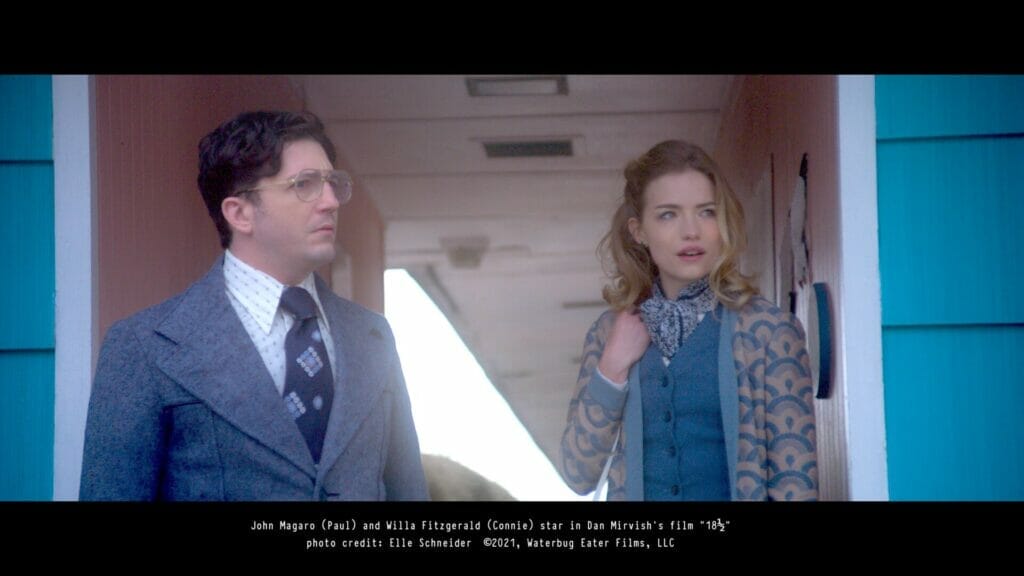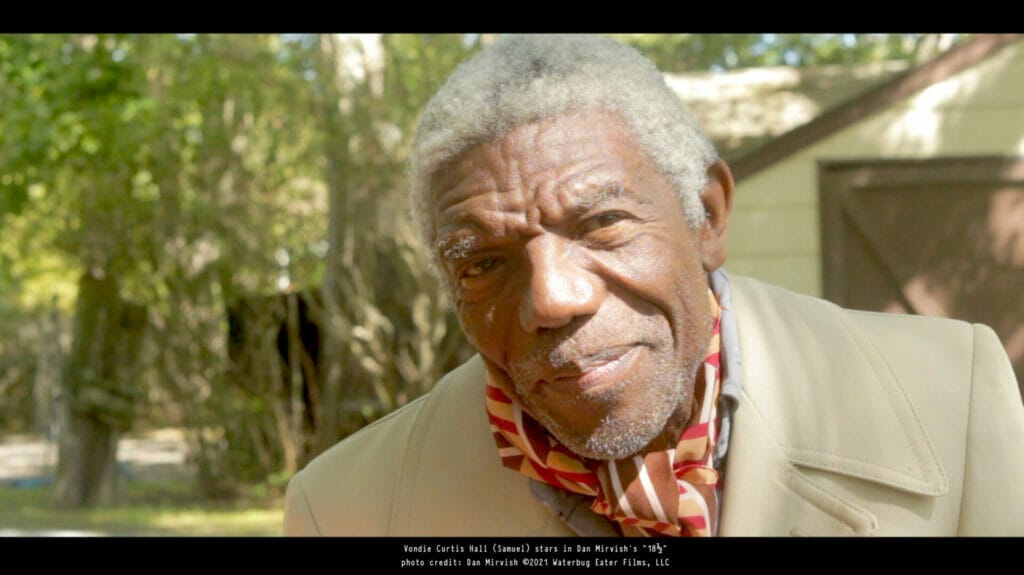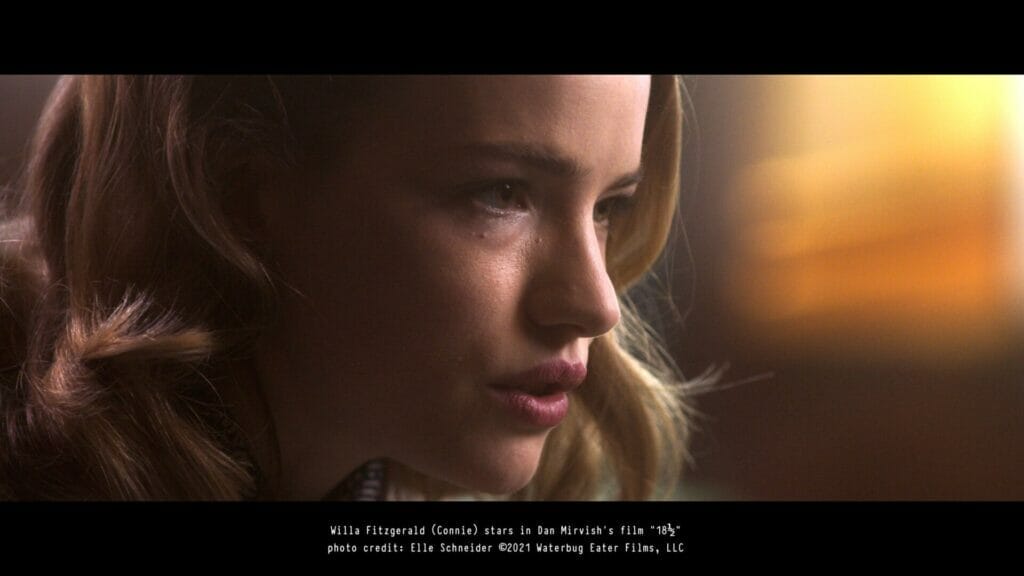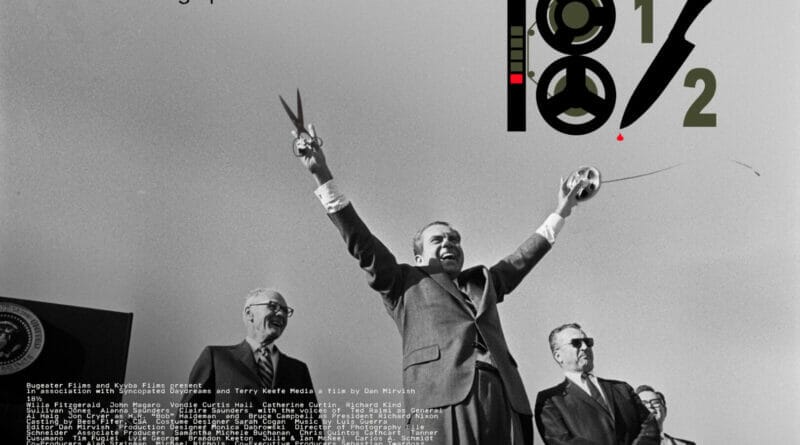Dan Mirvish’s latest film, 18 1/2, constructs the narrative amid Watergate as a White House transcriber and seemingly obtains the only known copy of the infamous 18 1/12 minute gap of the Nixon tapes.
I’m a sucker for politically driven narratives with such classics as ‘All The President’s Men’ and ‘Good Night and Good Luck’, so when I read the synopsis for the newest film by Dan Mirvish, I already sensed I was going to enjoy the trip. The structure is straightforward; the film is lean and very effective in bringing tension. The main protagonists are against the clock, trying to hear the mythical Nixon tape that will undoubtedly reveal all the dirty secrets that never saw the light of day.
The film begins quickly by recapping the situation at hand. The Watergate Scandal is unfolding, and Connie (Willa Fitzgerald) is preparing to meet Paul (John Magaro), a reporter that wants to uncover crucial information hidden in the tape she got from her workplace. The banter the two leads have is tight, efficient, and establishes who they are as characters while leaving room for the audience to explore the deeper layers they are hiding from one another.
We cut quickly to a flashback of Connie in her workplace as she first uncovers the tape. I have to stop and admire the use of sound design in this scene as she’s saying verbatim what is on the tape at the same time said tape is heard via audio. It’s a neat trick to show how efficient she is as a transcriber and how magnificent her memory is. At the beginning of the film, as she heard the radio, they also used the tape recorder clicks to transition from radio station to radio station, which was a very creative way to establish tone, and create some level of tension and anxiety imposed on Connie.

There’s also a moody 70s lens zooming out and tense music, seemingly setting the tone for the whole film. Paul and Connie decide to listen to the tape together after Connie does not want to simply hand over the tape over fears of being thrown into jail. They picked a small inn to listen to the tapes, and that’s when the movie starts shifting genre and tonal gears into more of a comedy and even romantic premise. Dan Mirvish doesn’t seem too keen on developing the political intrigue of a premise he has established. Instead, he tries developing this set of off-beat, weird characters and crazy interactions.
He uses the premise of an imaginary and relevant piece of political history as a jumping-off point into a comedic rom-com. The visual style and the production design are very well done, especially for an indie film; it’s very efficient and creative in handling the spaces and making the audience believe this is actually a period piece. But the plot starts adding what seems to be some contrivances to extend the runtime. When Connie and Paul get to the room, the tape recorder in the room “doesn’t work”. So now there’s some tension about what to do next, which had me a little hooked on how they would get out of this situation.
They asked around for a tape recorder. Paul and Connie talk to a group of revolutionary hippies and the hotel manager, but to no avail. Eventually, they are saved by an ostensibly affectionate older couple who invited them to dinner early on. They realize they have a perfectly usable tape recorder when entering their room. But unable to grab it and go, they decide to indulge the older couple for drinks and a lengthy conversation. There are elements of their dialogue that are fascinating. The critique of the news media and the exploration of how tense and shocking the politics were at that time are themes that still resonate to this day.

Unfortunately, I wasn’t too involved in the slowly evolving relationship between Paul and Connie. I understand why this character arc unfolds; Paul had a break-up, so he yearns for that love that he lost, and Connie’s tough veneer is starting to break and become more vulnerable as a result. But I wasn’t too invested in this aspect of the film. Ultimately, they get access to the tape recorder and finally go to their room to listen to it. This was the most fascinating and expertly crafted act of the whole film.
The camera is shooting the scene from the outside of the room, looking in – peering into the room as if it was a Peeping Tom looking at what they are doing. This creative choice adds great tension since you don’t know if they could be found at any point. The camera rarely breaks, digging deeper into a continuous long take that’s only interrupted sporadically by supporting characters that knock on the door to interrupt while they listen to the tape.
I’d wish the film would have pushed the boundary of this element further. It would have been a fascinating creative choice to keep the camera as a long continuous, uninterrupted take for the duration of the 18 1/2 Nixon tape – letting the action unfold as if it were a theater act with characters entering in and out of frame.
I still appreciate that, for the most part, the film commits to its premise and gives the audience the 18 1/2 tape for our auditory pleasure. It was a great treat to hear Bruce Campbell as Nixon giving a prominent performance as a man who doesn’t wanna get caught red-handed for his crimes. The dialogue in the tape is funny, intriguing, crazy, and very inventive. I thoroughly enjoyed hearing the recordings and all the bat-shit crazy things they exposed.

Ultimately it’s revealed, maybe not so surprising, that the older couple are Nixon goons who want to steal the tape and a fight ensues. In the aftermath, Paul dies, and Connie is the only survivor, only to realize that the tape has been recorded over. The epilogue shows that Paul lied about who he was and that he was working for Howard Hughes, who also wished to secure the tape and clean his name.
The ending shows a determined Connie willing to face whatever lies ahead of this ever-developing scandal. 18 1/2 jumps between a few genres and tones, and not everything sticks as well as one would think. Dan Mirvish decided to explore the chemistry between his performers and let that be one of the main driving points of the film.
Unfortunately, I don’t feel it was a successful tactic to tackle the topic at hand. In the end, the film seems distracted from what it wants to say. I can’t deny however it was satisfying ultimately to hear what was in this mythical tape, and it was worth it to get to this point. The production and costume design, as well as the closely-knit efficacious cinematography, combine to form a quite successful indie period piece. It ultimately just required a little bit more focus on what the goal for the narrative actually was.
’18 1/2′ is now playing in theaters.
Want to discuss things further? Hit us up on Twitter, Facebook, or Instagram. And for more film, gaming, anime, and TV news, trailers, and updates make sure to keep it locked right here at The Nerdy Basement. While you’re here, please consider supporting us on Patreon! It’s an easy way of supporting us so we can keep providing you with your Nerdy News!

